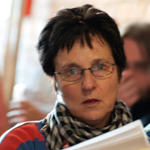Excerpt from Oscar of Between, Part 3
by
Betsy Warland
Category: Oscar’s anathema.
Although others’ descriptions for her loneness change over the years – tomboy, headstrong, stubborn, independent, odd, rebellious, arrogant, different, unrealistic – they all signal the same condition: one who does not play enough by the rules.
Categories being embodiment.
Of rules.
Being self-regulating
: automatic surveillance system.
Oscar looks the word up in her dictionary.
Category: “Any of the basic classifications into which all knowledge can be placed.”
An impossible — even perilous — notion.
The impulse of category more “not” than “is.”
Then there. In the etymology: “Greek kategoria, from kategorien, to accuse: kata – against + agorein, to speak publicly, from agora, assembly.”
… to accuse, speak publicly against from assembly …
~~~
To weep.
Cry centuries
: the suffering caused by all this against and accusing.
~~~
– weep –
~~~
Every applicable category; apparent label noosed Oscar.
In her sixtieth year a new one surfaces in her mind. Illusive yet ubiquitous. As light on water
– person of between –
And Oscar is at ease.
Resides.
~~~
Begins.
To notice.
– other persons of between –
A disparate, surprising array,
quiet recognition of
one an/other.

Guest Artist:
Cheryl Sourkes
Toronto, ON
https://www.cherylsourkes.com/
entre le chien et le loup

Photo: Work by visual artist Cheryl Sourkes
I first met Beta at the Queen Mother Café. And Queen Mother, as you can see from the language itself, is woman doubled, or, depending on the sign between terms, is woman squared. As those of us with mothers have experienced, the Mother is the Queen, but equally significant, the Queen is the Mother of us all. The thing is, both Queen and Mother are concerned with commands, with giving and taking orders — more precisely, with obeying, with being on time, with being on. While Beta was double female, in other words intrinsically lesbian, she was a post-community version, never on time, resistant to suggestion and prone to error. And I have to admit, I was just as bad. I suppose we never really had a chance; but we never really had a choice either. It was a large-scale, double Beta and Dark Matter experiment on the physical potential of GENIUS, or in any case concatenation, or rather as it turns out — incarceration. Together we explored the twenty most common grammatical errors. First
lay and lie, then
envy and jealousy. We got lost with
who and whom,
which and that,
fewer and less,
may and might,
since and because. We indulged in
affect and effect,
irony and coincidence,
whether and if,
bring and take. We were deep into Queen Mum territory. Of course it was completely disastrous. Love doesn’t conquer all, at all; it may be that trust and respect have a better chance. We tripped each other up, then couldn’t find ourselves. What followed was
farther and further,
disinterested and uninterested and finally
different than and different from, alongside
moot, nor and nauseous, ending up with
continual and continuous and extremely
anxious. All freighted with major
impact! I’m wondering now why we couldn’t determine better positioning in amongst all that dark matter and dark energy. We thought of ourselves as the most refined of instruments, even though when I think about it, weren’t we both still in development? I ended up feeling like an anti-neutrino produced in Beta decay. But it turns out I had other things to do in the world. Hot in cold dark matter, I projected my project forward. I could see Beta in the distance as a distinct number describing the correlated volatility of an asset in relation to the volatility of the benchmark that said asset compares to. In the end I paid for our coffee, left an overly generous tip and I boogied out of there — forever. We parted at this benchmark moment but ever since I’ve been waiting for the future to open up and turn around me. In some ways it’s all a matter of luck, isn’t it? I’ve heard Beta still appears in a variety of unrelated identities, but I can’t afford to see her. Yet. Maybe never.






i love the concatanation of cheryl sourkes’ dense in-between a dog & a wolf text with its sharp wit & play and oscar dismantling categories with all its space for us to bear wit(h)ness. both pieces make me work. turn things over. dis-cover. a neutrino i learn is a subatomic particle which operates differently from other particles. what if everything operates slightly differently from everything else? perhaps “a disparate, surprising array” would truly overtake us.
Categories. Shatter and reduce nature. Where forced onto it…incompletely written…inaccurately applied. Writers write categories, think them up. Keep writing.
It occurred to me that one of things this salon does is brings together the community of readers (usually isolated and silent) for a dialogue about what occurs during or via the reading experience. It exposes that unspoken world which each reader creates for themselves out of the seeds of the original creation.
Very cool.
So great to be able to read part of the work like this as it progresses, a real treat! Thank you Betsy. Part 3 reminds me more of my ‘a girl called brian’ manuscript I am so glad to be working with you on in VMI. A perfect fit, I am so glad of your Betsy/Oscar understanding – in between – and the conversation we had last year about Judy Grahn’s 1971 poem Edward the Dyke, amongst so many other things! A flash fiction version of ‘a girl called brian’ online here: (scroll to the bottom of the page for story)
http://www.gayexpress.co.nz/2013/02/queer-authors-honoured/
Meg Torwl
Ingrid, Louise, Trish and Meg: so enjoy your thoughts and ways you each provide expanded contexts for Oscar’s April Salon. Your comments, along with a conversation with Betsy Nuse, have helped me identify why I delight in reading each month’s comments.
Part of it is the surprise: for me, your comments are the “wild card” contrasted to the known cards of my Oscar excerpt and the excerpt of the Guest Writer or Artist.
Ingrid, you mention “bear wit(h)ness,” and Trish, “what occurs during and via the reading experience.” In conversation with Betsy Nuse, she observed that book reviews are the only public written response space dedicated to the experience of reading.
For me, book reviews differ in their tendencies to summarize and rate a book. What about blog comments? They also seem to differ: typically, they are quick reactions or extended information sharing or the advancing of opinions.
Might your comments be a kind of new subgenre of tracking creative interactivity and thought? Do they, in their made-visible existence, give us glimpses of that dynamic, creative space between betweeness?
Hey, Betsy/Oscar, here’s me waving at you – across the Saskatchewan and Alberta parklands, over the Rockies and into your studio – from St Peter’s Benedictine monastery near Humboldt SK. I’m on a personal retreat, to simultaneously catch up and slow down. And so it is that I have caught up with Oscar parts 3-5. but it’s about Part 3 that I have most responses so this is where I am commenting.
As usual, my experience of reading the text is that I make myself slow way down so that I can follow what you’re doing – not only words but punctuation and line-breaks – which is unlike any other reading experience I have. (Normally I am reading textually-dense nonfiction and occasionally fiction and lyrical poetry.) So, right there, in the second para (if that’s what it is) I come to a screeching halt at the colon at the beginning of the line (a sign to me to “stop right here!”) and then inhale, like an intake of breath, the stunning (linguistically but especially politcally) next three words: automatic surveillance system. I say “politically” because of all the revelations these days of the massive surveillance systems our own governments have in place to monitor us, and of the brave souls who are exposing the operation of these systems and exposing themselves to grave peril…and so, it has just occurred to me, perhaps Oscar’s situation/location “of between” is also a resistance to surveillance.
I think this must be so, because of what I learn next in the text, namely the intuition that there is “peril” in the act of categorization, given the etymology of “category.” When I got to the italicized line, “to accuse, speaking publicly against from assembly,” I had a whiff of sheer terror – not on my own behlaf but on behalf of all those “in between” (for whatever reason) men and women who have endured the terrifying isolation of standing exposed – accused – before the “assembly” of any collective that has the power to break them. It’s almost a relief to come to the next line, “To weep.”
And them comes the release, the ease, the residence in the category-resistant self-of-between.
One quibble about the next and final section: how does Oscar recognize an/other when s/he is “between,” not here and not there…?
Love, Myrna
The long space between before ‘to weep.’
What can I say?
betsy. (Empty space made me want to cry.)